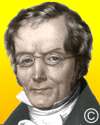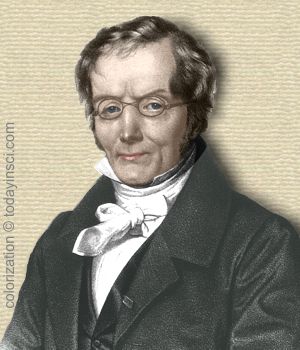 (source)
(source)
|
Jean-Étienne-Dominique Esquirol
(3 Feb 1772 - 12 Dec 1840)
French psychiatrist who was a pioneer of the humane treatment of persons considered insane.
|
The Life of Equirol
condensed from a Eulogy presented by M. Pariset on 17 Dec 1844
at the Academie de Medecine, Paris
At the late annual public meeting of the Academy, M Pariset, the eloquent perpetual secretary, chose for the subject of his oration, the life and writings of the celebrated Esquirol. From this admirable discourse we shall extract a few biographical details, which cannot but prove interesting to our readers, who will shortly be introduced by M. Baillarger to the theatre of his labours, the Salpétrière Hospital.
Esquirol (Jean-Etienne-Dominique) was born at Toulouse, in 1772, and was destined by his parents for the church. His first classical studies were carried on at the College of Esquille, which he left only to enter the seminary of St. Sulpice, at Issy, near Paris. From this peaceful retreat he was expelled, along with his fellow students, by an eruption of the revolutionary demagogues, and obliged to return to his native town. Religion being then proscribed, he turned his attention to medicine, and studied under the auspices of Gardeil, the translator of Hippocrates, and of Alexis Larrey, the uncle of Jean-Dominique Larrey, the future surgeon of the “great army,” who had established a medical school in that town. Here Esquirol soon became a favourite with his professor, from the zeal and assiduity with which he cultivated the elements of the medical sciences. Picot Lapeyrouse, the well-known botanist, was his botanical master, and with him he made several interesting excursions to the Pyrenees, whilst Lapeyrouse was collecting the materials for his “ Flora of the Pyrenees.” After a few years' study, he was appointed officer of health to a division of the army, quartered in the Oriental Pyrenees, and passed two years at Narbonne. Barthez, who was then in great reputation, and enjoyed a large practice in that town, offered him the post of private secretary; but fearing the temper of the great physician, a very irascible man, Esquirol declined the offer. During his residence at Narbonne, he gave several instances of his humanity and moral courage, and among others, the following, which redounds too much to his credit to be passed over in silence. France was then covered with revolutionary tribunals, the sole occupation of which appeared to be to condemn, not to judge. The accused were defended, at Narbonne, by a barrister, nearly the only one who was allowed to speak, who supported the cause of his clients in doggerel verse, thus adding, as it were, insult to inhumanity. Esquirol, in a fit of indignation declared one day, on leaving the tribunal, that he could have defended the prisoners better himself A woman, whose husband was to be judged the following day, overheard him, and entreated him to take up her husband's cause. After some hesitation, he consented to appear before the tribunal. This he did, and, by an eloquent appeal, so worked on the feelings of the judicial executioners, that he obtained the pardon of his client. On another occasion, he, with equal courage, undertook the defence of a workman, accused before the revolutionary tribunal of his native town, and was equally successful.
Esquirol's taste for study not agreeing with his position as a subordinate young officer in the army, he obtained his discharge, and proceeded to Montpelier in 1795. Here he turned his attention more to natural history, mathematics, and literature, than to medicine, which he had not then made up his mind to follow as a career, and gained several academical honours. The fortune of his family having, however, become seriously compromised by revolutionary events, he was obliged to think seriously of the furore, and decided on going to Paris, to prepare himself for the practice of the medical profession. He arrived in Paris in 1798, and was then nearly as poor as Portal, Vauquelin, Dupuytren, and so many other medical men to whom labour has been the road to glory and opulence. An inconsiderate act added still further to his distress. His father had given him a small sum in gold, which he had sewn in the folds of an old wornout garment Forgetful of the circumstance, he threw the garment out of the window, only recollecting, when too late, that it contained his small treasure. His father, to whom he wrote for a renewal of assistance, disbelieved his tale, and would not for some time supply him with funds. In his distress he remembered that he had a friend, M de Puysieulx, whom he had known at the seminary, then tutor of the present Count Molé, and living at Vanguard. On his going to M. de Puysieulx and narrating his misfortune, his friend introduced him to Madame Molé. This lady received him very kindly, and offered him a room in her house, which he gladly accepted. He remained for two years under her hospitable roof of and during that time followed assiduously the clinical lectures of Pinel at the Salpétrière, as also the lectures at the Garden of Plants, and at the School of Medicine. His labours were lightened by the friendship and companionship of Bichàt, Roux, and Landré Beauvais, whom be ever revered and cherished. The long walks between Vaugirard and the seats of his studies, although fatiguing during the winter, were most agreeable during the summer, and were often enlivened by the presence of his friends. Indeed, he ever afterwards referred with pleasure to the years he thus passed.
Pinel was then in the height of his reputation. The Salpétrière, usually nearly deserted, was the favourite resort of both students and practitioners, whose attention was thus divided between the clinical lectures of Pinel and those of Corvisart, then at the Charité. Esquirol at once imbibed the ardent philanthropy of Pinel, and, like him, became anxious to alleviate the sufferings of the unfortunate insane, who had heretofore been treated more like wild beasts than men sorely afflicted. Pinel soon singled him out of the number of his pupils and followers, and appreciating fully his talent and warm Christian charity, made him his friend and assistant The “Medecine Clinique” of Pinel, which appeared in 1804, was drawn up in a great measure by EsquiroL In 1805, he graduated at the Faculty of Medicine of Paris, having written a Thesis on the Passions, which has been much admired. At the death of Pinel, Esquirol was appointed physician to the Salpétrière, and from that time devoted his life entirely, we may say, to the study of insanity, and to carrying out the philanthropic views of his noble-minded predecessor. He was also subsequently placed at the head of the large insane hospital at Chareuton, and thus enjoyed the advantage of being able to pursue his investigations in both these wide fields, and of being able to apply to them the numerous ameliorations which he introduced into the management and treatment of the insane. During the course of his career, he wrote many essays on various points connected with the pathology of insanity, which essays were collected and published under his eye, in two volumes, in 1838. His success as a private practitioner kept pace with his reputation as a professor and a writer, and during the last five and twenty years of his life he was considered, not only by his countrymen, but also by foreigners, the first authority in all cases in which the state of the mental faculties was involved.
The constitution of Esquirol was naturally delicate. Some years before his death, he became subject to catarrhs, the attacks of which gradually became more frequent and more intense. In December, 1840, he was seized more severely than usual. Instigated by his usual zeal in the accomplishment of his duties, he persisted in going to the Board of Health, of which he was a member. On his return home he was taken worse, and died, in the course of a few days, of pneumonia, surrounded by his friends and colleagues, Messrs. Leuret, Louis, Calmeil, Mitivié, and Baillarger. His last words to them were—“I leave you; remember me. May you prosper! but never banish from among you peace—that peace which is the certain pledge of every happiness!”
- 3 Feb - short biography, births, deaths and events on date of Esquirol's birth.





